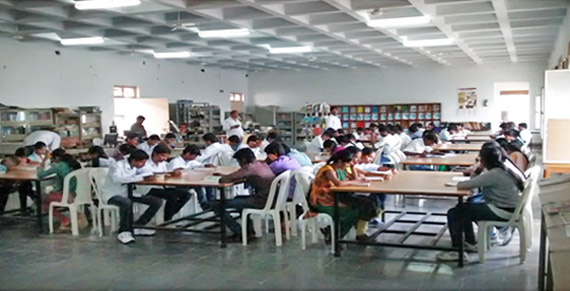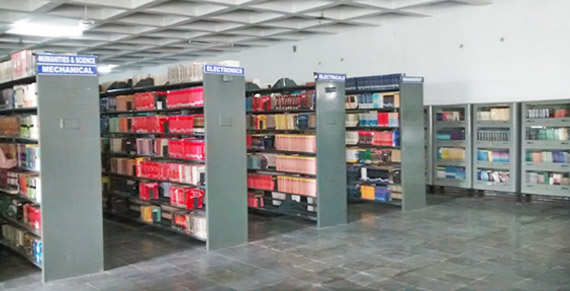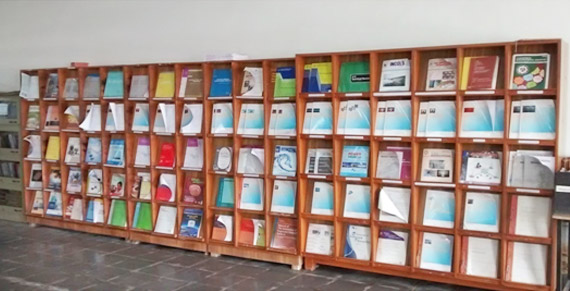The Library supports the teaching and research programmes of the Institute and provides facilities for general reading and disseminates information according to the requirement of the users. The Library follows Open Access System for benefit of users and with the area of 675Sq.mtrs.

It has around 45000 books, back volumes, standards, CD-ROMS, NPTEL DVD's and ebooks etc. it receives 200 Journals, (125 Indian and 75 foreign). It also receives above 2000 on-line journals through by DELNET.
The services and operation in the Library are fully computerised. The database of entire Library acquisitions was created using KOHA software.
The Library functions such as Acquisition, Circulation control, Cataloging and Serials control have been automated using an integrated software called "LIBSYS". RFID Library Security Systems and Technology has been implemented in the Library functions and services.
The users can search the Bibliographic data viz. Author, Title, Subject, Classified No. etc., through OPAC of terminals installed at the Circulation Counter and various places in the Library and also can search in the campus LAN.
The Library works on all working days of the year except a few holidays of national and social importance.
| WEEK DAYS | DURING HOLIDAYS |
|---|---|
| 8.30 A.M. to 7.00 P.M. | 9.00 A.M. to 4.30 P.M. |
The enrollment of Membership will be extended to all the bonafide students of UG/PG programmes and Faculty, Administrative Officers and Ministerial and Supporting staff of the Institute. The prescribed Membership forms can be had from the circulation counter.
| CATEGORY | NO. OF BOOKS | PERIOD OF LOAN |
|---|---|---|
| UG Students | 3 | 14 Days |
| PG Students | 3 | 14 Days |
There are (2) Book - Banks in the library. Book - Bank for SC Students Book - Bank for ST Students . The books will be issued once to students of those categories according to their eligibility at the beginning of the semester.
i) Reference Books The section contains reference books such as Encyclopedias, Dictionaries, Directories, Handbooks,Bibliographies, Atlases, Data Books, M.Tech dissertations, etc. These are to be referred within the Library premises, but are not for lending.

ii) Text Books A copy each of the prescribed textbooks and other recommended books are kept in the Text Book collection and these are to be referred on the Library premises only. A separate Section for Reference and Textbooks is provided with a seating capacity of 240 members.

The Library receives about 200 journals, out of which 125 are Indian, 75 are received from foreign. All the current periodical are displayed on the periodical racks in the section with a seating capacity of 120.
There is a well - equipped Xerox facility in the Library. The users can avail of this facility on payment of nominal charges.
The Library is connected to the CAMPUS LAN. The Library server works under Linux environment. Subsequently, the house keeping operations and services such as a acquisition entries, serial control, circulation of books, using of Barcode system for issue and return of books have been computerised. The faculty members can access the bibliographic data from their respective departments through the campus LAN. (http://172.168.1.102/)
The Library has campus LAN connectivity through the Computer Centre and is connected to Server. 60 systems providing network facility are installed for browsing. The AICTE New Delhi setup a consortia - based subscription to electronic resources for technical education system and receiving about 2000 on-line journals viz. IEL (IEEE/IEE Electronic Library, ASME, ASCE, Applied Science and Technology Plus (ASTP), ACM Digital Library, Springer Verlag Link, Nature, J-Gate, Indian Standards 18,000 in e-form from 2003 onwards. The Library has installed a Hard Disk cashing solution (500 GB) in the Digital Library to store massive data of archival information.